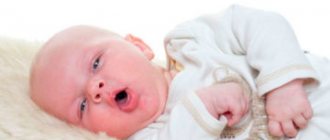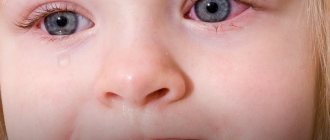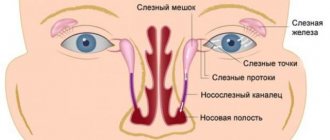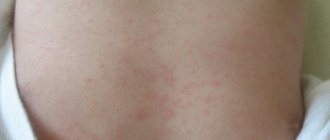When you don't need to worry
A child may rub and scratch his eyes for the following reasons:
- The baby wants to sleep. In this case, there is no need to worry, as this is a normal reaction to fatigue.
- If a baby rubs his eyes and nose, scratches his ears, then most likely he is teething. During this period, children become capricious and irritable; their bowel movements may change, their temperature may rise, and their appetite may disappear.
- When there is a sharp change in darkness and light, the baby may also rub his eyes.
- A change in daily routine can also cause your baby to periodically scratch his eyes.
- While bathing, water, soap, shampoo or foam may get into your child's eyes. Even after bathing, the irritant remains on the mucous membrane for some time, which causes itching of the eyes.
Foreign body entry
The most common reason why a baby rubs his eyes is a foreign object getting into them. Even an eyelash or a grain of sand can cause an unpleasant feeling of discomfort. Do not forget that the presence of the smallest object in a baby’s eye can cause a lot of complications. The child will reflexively try to get rid of the foreign body, begin to scratch his eyes with his hands and can cause an infection. Therefore, parents should constantly monitor their baby’s hand hygiene. You need to be especially careful when playing with sand in a children's sandbox. Contact with dirty sand can cause serious eye diseases that require medical treatment.
If a grain of sand or speck gets into the baby’s eye, the procedure for parents is as follows:
- conduct an eye examination and identify its location;
- Rinse your eyes with boiled water or weak tea.
If a large foreign body or parents cannot cope with the problem on their own, then it is better to consult an ophthalmologist as soon as possible. Your attempts to remove the object can cause pain and only harm the child, while a specialist will deal with this quickly and painlessly.
Serious reasons
There are reasons that you need to pay close attention to. They can lead to unpleasant consequences in the form of health complications.
Foreign object
The most common cause of infants rubbing their eyes is a foreign body. An eyelash, a fluff, or a grain of sand causes unpleasant sensations, which the baby tries to get rid of with a fist. Scratching the eyes can lead to complications, such as infection. It is important to keep your hands clean during infancy.
If parents are sure that a foreign object has gotten into the baby’s eye or that it is clearly visible in the eye, they should rinse the eyes with boiled water or weak, warm tea. When a foreign object cannot be removed or is large, it is better to contact a specialist. The ophthalmologist has many instruments for examination, will remove the foreign body without pain, and will additionally examine the baby.
Contact with household chemicals
The delicate and sensitive eyes of infants quickly become irritated when they come into contact with household chemicals. It is advisable not to use air fresheners, deodorants, or other sprays in the baby’s room.
It is necessary to use as little chemical powders as possible for cleaning furniture, carpets, and floors. You can wash everything near the baby with regular baby soap. In rare cases, it causes irritation and an allergic reaction.
Effect of dust
Even with daily wet cleaning, it is difficult to avoid dust accumulation. When dust particles get on the mucous membrane of the eyes, irritation occurs, which the baby tries to relieve by scratching. You should not clean when the child is in the room. This will cause dust to get on it.
The baby’s crib does not need to be covered with canopies and soft sides. A lot of dust settles in fabrics. It is advisable to wipe all parts of the crib with a damp cloth every day to ensure cleanliness and dust-free conditions. Bed mites love to live in it.
Food allergies
A baby may rub its eyes while awake due to food allergies. This reaction will be accompanied by nasal congestion, frequent sneezing, redness and swelling of the eyelids. This is observed closer to 6 months, when a nursing mother begins to introduce new foods into her diet, and the baby is given vegetables to try.
To get rid of an unpleasant symptom, you need to exclude the product from the menu and postpone its introduction into complementary foods to a later date. If an allergic reaction develops abruptly with pronounced symptoms, for example, skin rashes, fever, you should consult a pediatrician. Antihistamines will help. You cannot give them to your baby on your own.
Conjunctivitis
The cause of a baby rubbing their eyes may be conjunctivitis - inflammation of the conjunctiva due to a viral, bacterial infection or allergic reaction.
Additionally, the following symptoms are added:
- protrusion of pus, drying in the form of crusts on the eyelashes;
- swelling and redness of the eyes;
- sticking of eyelashes after sleep;
- photophobia;
- itching, burning eyelids;
- decreased appetite;
- Bad mood.
The disease is contagious, you need to keep your hands and household items clean so as not to infect your recovering baby. Treatment is prescribed only by a doctor.
Seasonal allergies
Pollen from some plants can cause an allergic reaction, including itching of the eyelids. For this reason, the baby will scratch its eyes. These manifestations are inherited, so parents who also suffer from seasonal allergies need to carefully monitor their child. If you suspect symptoms of the disease, you should consult your doctor about preventive measures.
Eye inflammation
In young children, the tear ducts, eyelids, and eyeballs can become inflamed, stye may develop, and a boil may form. With all these diseases, there is increased lacrimation, swelling and redness of the eyelids, pus discharge, and high photosensitivity. In severe cases, fever and blurred vision. If there are any signs, you should visit a doctor; self-medication is unacceptable, there is a risk of complications.
Allergy
A common reason that a baby rubs his eyes during sleep and while awake is the development of an allergic reaction to medications, dust, food, animal hair, etc. In this case, in addition to itching of the eyes, you may notice symptoms such as nasal congestion, sneezing, swelling and redness of the eyelids, and itching. Treatment of the disease consists primarily of removing the allergen and taking antihistamines prescribed by the pediatrician.
Why can a child rub his eyes in his sleep?
Sometimes babies rub their eyes in their sleep. In this case, you need to pay attention to the bed linen, the presence of soft toys in the bed, mattress filling, and pillows. There is a possibility of an allergy to some irritant at night.
The canopy over the crib can accumulate a lot of dust, which also irritates the mucous membrane of the eyes, causing a burning sensation. Dry air in the room can provoke a baby to scratch its eyes.
Inflammation of the eye
This pathology is diagnosed in infants quite often and can have the following forms:
- barley;
- inflammation of the eyeball, tear ducts or eyelid;
- furuncle.
With any of these diseases, the baby constantly rubs his eyes, he experiences symptoms such as lacrimation, redness of the eyelid, swelling, copious discharge (usually purulent), itching and pain in the eyelids, increased sensitivity to light, possible blurred vision and increased temperature. If these symptoms appear, you should immediately consult a doctor and undergo an examination. It is important for parents to remember that they should not self-medicate. This can lead to a worsening of the situation and provoke the development of complications.
When should action be taken?
In most cases, eye rubbing in childhood is not a dangerous symptom, but there are conditions that require immediate action. The following signs should alert you:
- Hyperemia, swelling of the eyelids;
- Long, constant lacrimation;
- Uncharacteristic discharge (clear, purulent);
- Souring of the eyes.
In these cases, we can talk about injuries, infections, allergic reactions. Consult a doctor - he will conduct a comprehensive examination and prescribe competent treatment.
Conjunctivitis
This disease is characterized by inflammation of the conjunctiva of the eye due to a bacterial or viral infection, as well as allergies. Symptoms of conjunctivitis in infants are:
- itching and burning;
- photophobia;
- sticking of eyelids after sleep;
- formation of purulent yellow crusts;
- swelling and redness of the eyes.
In addition, the baby may not eat well, sleep poorly, become capricious and whiny. Nowadays, pharmacies have a fairly large selection of anti-conjunctivitis medications. However, only a doctor can advise individual treatment.
Treatment
If a baby rubs his eyes and is diagnosed with an infection or inflammation, the doctor will prescribe anti-inflammatory or antibacterial therapy. The course of treatment includes taking antiviral drugs or local or general antibiotics. To stimulate the body's immune forces, children are prescribed vitamin complexes and medications that help strengthen the immune system. If an allergy is detected, the baby will be prescribed antihistamines and an appropriate diet. In almost all cases, the child will need to wash out the eyes and instill drops.
Why does a baby rub his eyes?
In addition to the diseases already listed, infants rub their eyes for absolutely safe reasons, such as the desire to sleep or getting to know their own body. In the first months, you can observe that the baby is actively exploring his hands and often reaching for his face, sometimes involuntarily. This reaction is within normal limits and should not cause concern.
If the reason for your child constantly scratching his eyes is the process of teething, there is also no reason to worry, offer your baby a teether (special chewing toys). If anxiety is very strong, then you can use special compositions for gums that relieve itching and pain. As soon as the teeth erupt, all other symptoms will also subside.
Of course, the reason that a child rubs his eyes can also be a banal contact with soap or water during water procedures. If soap gets in, just rinse your eyes with cool water and calm your baby down.
Washing rules
So, the parents’ actions, if the baby rubs his eyes and the doctor recommends rinsing, will be as follows:
- put the baby on a changing table or bed;
- take a solution for washing (neither hot nor cold, optimally at room temperature);
- moisten a clean swab or cotton wool and gently rub it over the eye (it is better to lead to the nose, paying special attention to the corners);
- We blot the baby's eye with a napkin soaked in boiled water.
There is another way to wash your baby's eyes. You will need a regular medical pipette for this. First, you need to take the rinsing liquid into a pipette, drop it into the baby’s eye, then turn the baby’s head to the side. The liquid will flow out on its own through the outer corner. After the procedures, it is necessary to leave the baby in a lying position for 20-30 minutes.
How to instill drops correctly
When a baby rubs his eyes with his hands and there is a need to rinse and put drops into the eyes, you need to know the following:
- observe hand hygiene: when performing procedures, hands should be clean, nails should be cut short;
- the solution and drops should be warm or at room temperature;
- the child must be distracted from the procedure in every possible way so that he is not afraid;
- It is better to sterilize the pipette by boiling it or lubricating it with a special liquid;
- Before instilling the drops, the baby’s eyes need to be rinsed;
- the baby must be placed on his back, his head tilted back (you can swaddle the baby at this time so that he does not wave his arms);
- when instilling drops, the baby’s eyelid should be pulled back, the drops should be dropped and released; you should avoid touching the mucous membrane of the baby’s eye with your own hands;
- After instilling the drops, you can massage the eyelid so that the medicine disperses.
The procedures for instilling drops and washing the eyes of a baby are simple. Don't be nervous, worry or rush. The child will not cry and kick if he feels the mother’s confidence and calmness.
Therapy: basic principles
Treatment for itching in the eyes and simply their constant rubbing depends on the factors that caused the development of this phenomenon. The doctor may prescribe antibacterial, restorative, vitamin supplements, antihistamines, antiviral drugs, antiseptics, and diet.
If you have poor sleep, correcting your daily routine and taking frequent walks can help. Rinsing and instillation will be useful in any case.
How to do rinsing
Eye rinsing eases the condition of allergies; in case of a foreign body or conjunctivitis, they are mandatory. Procedure:
- Place the baby on the bed or changing table, and place the older baby in front of you.
- Take the prepared solution - it should be at room temperature. Soak a cotton swab or pad in it, gently rub it over the eye, especially carefully treat the corners where discharge accumulates. You can use a pipette for rinsing - the product is drawn into it, which is then gently dripped into the corner of the eye. The pipette should be disinfected after each use or a new one should be taken.
- Wipe your eye with a cloth soaked in clean boiled water.
If the child resists, shakes his head, or hits his arms, ask someone to help you carry out the procedure. The same goes for eye drops.
Burying
If your doctor has prescribed eye drops, they will need to be used 2 to 6 times a day, depending on the instructions. Preliminary rinsing is done - every time or whenever possible. Wash your hands and keep your nails short. No need to use gloves.
Warm the bottle with drops in your hands first, especially if it was previously in the refrigerator. If the baby is naughty, distract him, come up with a magical story about droplets handed down by a forest fairy or something like that.
It is necessary that the child does not struggle or cry, because this negatively affects the results of the procedure (you may not get into the eye, the drops will flow out along with the tears, etc.).
If the bottle does not have a dropper, use a pipette - its tip should be sterile. When there is neither a dropper nor a pipette, take a syringe without a needle - it is difficult to dose the product with it, but it is possible, do not take too many drops so as not to drip too much.
Before the procedure, the child’s head must be carefully tilted back; infants are held with both their head and hands so that they do not pull out (an assistant is needed). Newborns can also be swaddled, the main thing is to immediately remove the diaper after the procedure. Pull back the lower eyelid, place a drop of the product in the corner of the eye, try not to touch the mucous membrane and release the eyelid. To prevent the medicine from flowing out, hold the corner of your eye for at least 30 seconds, you can do a light massage.
Folk remedies
If a child often rubs his eyes, in the absence of serious symptoms, folk remedies can be used for preventive purposes:
- Infusion of tea leaves - it is best to use black leaf tea; you need to infuse it for about half an hour. Use it warm to wash your eyes;
- Marshmallow helps with itchy eyes. Take a spoonful of ground raw material into a glass of boiled water, let the powder brew, strain and use topically;
- Chamomile – take a teaspoon of dry herb in a glass of water, simmer over low heat, let cool and strain. The product perfectly soothes the eyes and can be used in the complex treatment of allergies;
- Eyebright - a couple of spoons of the plant per 300 ml of boiled water, pour boiling water and boil for several minutes, cool.
Traditional methods
On the recommendation of a doctor, you can use a decoction or infusion of medicinal herbs for rinsing.
- Chamomile decoction. To prepare the decoction you will need the flowers of the plant. Place a teaspoon of herbs in a glass of boiled water, stir, pour into a container and cook over medium heat for 10 minutes after boiling. Then the broth must be cooled and strained.
- Marshmallow infusion. The marshmallow rhizome must be crushed into powder and placed in a glass of boiled water (you will need 1 teaspoon of the herb). Infuse the medicine for 8 hours under a closed lid. Then filter and use.
- Eyebright decoction. Place two teaspoons of herb in 300 ml of boiled water and cook for 5-6 minutes. After preparation, the broth is left to cool, and then filtered and used.
You can use regular black tea to wash your baby's eyes. To do this, you need to throw no more than one gram of tea leaves into a glass of boiling water. Then the glass must be tightly closed with a lid and left for half an hour. The finished infusion must be filtered and used for its intended purpose.
If a baby rubs his eyes and this is an isolated case, then there is no cause for concern. If the friction is constant and is accompanied by the appearance of dangerous symptoms, then you cannot do without the help of a doctor. It is important to remember that timely assistance to the baby will greatly ease the situation and speed up recovery.
Useful video
In the following videos you can find useful information about eye irritation in your baby:
There are a lot of factors that cause a child to rub their eyes. If this occurs once, then there is no cause for concern. But if a child constantly rubs his eyes, you need to show him to a doctor. Timely medical care will help preserve children's health.
Author's rating
Author of the article
Alexandrova O.M.
Articles written
2100
about the author
Was the article helpful?
Rate the material on a five-point scale!
( 1 ratings, average: 5.00 out of 5)
If you have any questions or want to share your opinion or experience, write a comment below.










